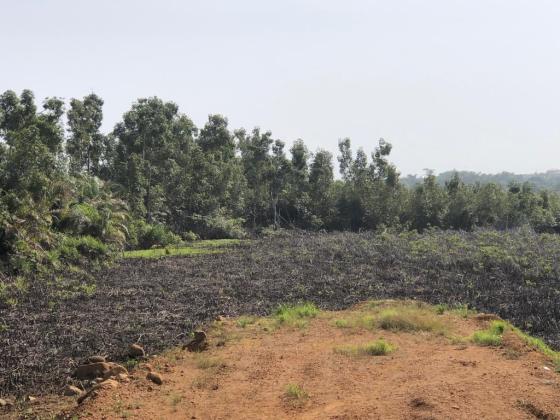Liberia: Wetland Degradation Hinders Livelihoods in Marshall

…. But East International apologizes and promises to restore the area “after completion of road construction project”
Mary Trokon at her home in Kpor town, lower Margibi County
For decades Mary Trokon has survived from what locals referred to as “laying baskets' ' to catch crawfish and freshwater fish along the St. John River in Kpor Town, lower Margibi County.
But the degradation carried out by EAST International in the Marshall wetland that runs directly into the St. John river, where Mary used to catch crawfish to sell, has now created a hurdle to her survival.
“The mud can make the crawfish go away,” she said. “When we set the baskets [dah] so-so mud we can catch.”
Fengshou International, a rock quarry belonging to East International, had earlier requested a permit from the Environmental Protection Agency (EPA) to allow them to construct a 2-kilometer road in the Marshall wetland in Schiefflin Town, Margibi County, for its machinery.
This request, the EPA claimed, was denied with a warning to desist from the project. But the company exhibited a defiant posture and started backfilling the wetland with red mud, without considering the vast benefits of the wetland to Mary and the environment.
“We are just sitting at home doing nothing. The fish and crawfishes are going away up the river and it’s risky for us to go there,” said Miatta Kemoh, another fisherwoman.
Liberia is a signatory to the Ramsar Convention on Wetlands, which calls for a global commitment to the conservation and wise use of the world’s wetlands. Signatories to the Convention envision a future where all people take action for the wise use of wetlands.
Liberia has five wetlands of importance. They include Marshall in Margibi County, Mesurado in Montserrado County, Gbedin in Nimba County, Lake Piso in Grand Cape Mount County, and Kpatawee in Bong County.
Hired by the government of Liberia to construct the road from Roberts International Airport to the ELWA Junction, EAST International, in order to speed the works, deliberately ignored the importance of the wetland, prompting the EPA to temporarily shut down the quarry.
Even after having shut down construction activities at the company's site, EAST International still exuded a defiant posture, EPA said, creating an unusual business for the residents, who are now struggling to survive.
However, the company has apologized and vowed to restore the area, according to the EPA with a fine of US$150,000.
According to a release from the EPA, EAST International CEO, Cao Yunfeug, formally wrote a letter to the agency on January 11, 2023, acknowledging the violation and pledging to restore the area.
“We sincerely apologize for whatever violation we have done against the rules and regulations of the Environmental Protection Agency Laws of the Republic of Liberia,” said Yunfeug.
“In this regard, East International Group, Inc. hereby commits to the Government of Liberia through the Environmental Protection Agency that there will be a full and total restoration of the wetlands in line with the Ramsar Convention, following the completion of the road construction project,” Mr. Cao added.
The Agency has also lifted the temporary halt order placed on Fengshou International, a rock quarry being used by East International and Sino Liberia.
According to the EPA, the decision to lift the shutdown order follows a meeting with the company and the Ministry of Public Works on 12 January 2023.
“Considering the critical nature of the RIA road construction work and as clarified by the Ministry of Public Works that your project relies primarily on Fengshou Rock Quarry and in the spirit of promoting sustainable development, the Agency thereby lifts the temporary shutdown order,” EPA Executive Director, Prof. Wilson K. Tarpeh said in a letter to lift the halt order.
During the January 12 meeting, East International acknowledged violating the Environmental Protection and Management Law (EPML) of Liberia and apologized for the level of damage done to the Marshall Wetland in Margibi County.
The Agency also asked East International and Fengshou International to immediately halt all backfilling of the Marshall Wetland, including further expansion of their rock quarry.
The EPA also requested the Chinese companies to create an operational activities plan in addition to the existing environmental management plan to run the quarry and haul rock aggregates.
East International uses the existing route, which was being utilized before the backfilling and construction of the illegal haulage road.
According to Prof. Tarpeh, the unauthorized backfilling and the alteration of the Marshall wetland is contrary to section 75 of the Environmental Protection and Management Law (EPML).
East International CEO, Mr. Cao promised to provide, within a week, a comprehensive plan on how his firm will restore the degraded wetland following the completion of the RIA road project.
Michael Yonjaye, Kpor Town Chief, described the situation as unfair and a failure on the part of the government to put their citizens' interests first. “This is our only means of survival. Our people catch their fish and crawfish to sell to feed their family,” he said.
According to him, when EAST International was carrying out the degradation, they engaged the company but were told that they had been permitted by the government to carry out the work.
